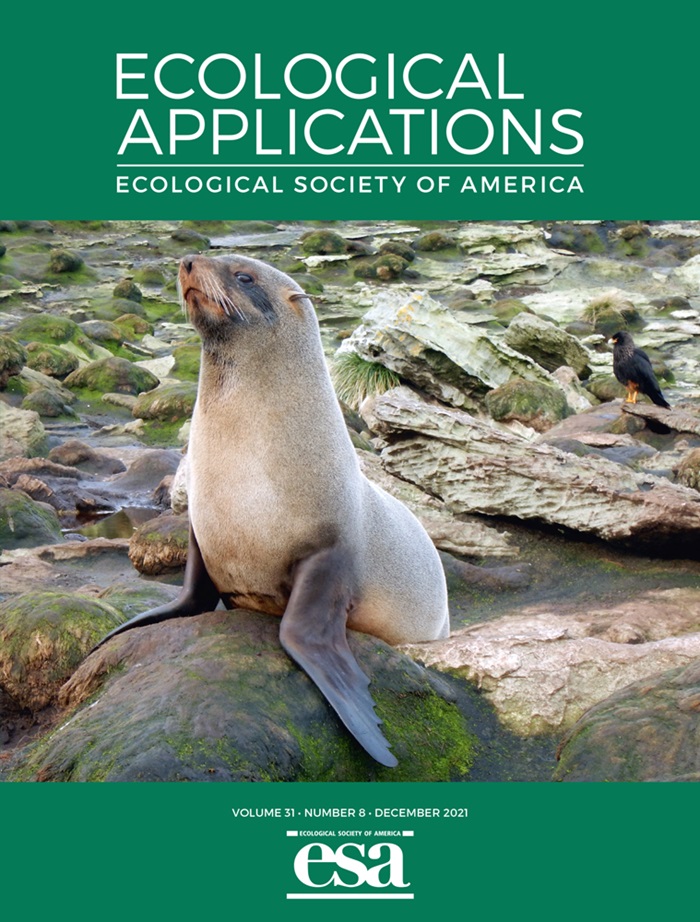陆地使用对当前保护缓冲区以外地下水动物的影响
IF 4.3
2区 环境科学与生态学
Q1 ECOLOGY
引用次数: 0
摘要
陆地和水生生态系统紧密相连,对应用资源管理和保护有着直接影响。众所周知,人类土地利用的变化和陆地系统的集约化会对地表淡水生态系统产生巨大影响。与此形成鲜明对比的是,对土地利用对地下水群落的影响的研究和认识却相对滞后。土地利用对地下水群落的影响强度以及这种相互联系的空间范围在很大程度上都是未知的,尽管我们依赖地下水作为一种关键的生态系统服务来提取饮用水。在这里,我们分析了瑞士不同农业密度和人口密度地区用于提取饮用水的几百个浅层地下水含水层中的地下水片脚类动物。尽管饮用水抽取点一般建在对水质影响最小的地点,但我们发现,周围集水区的土地利用类型和强度与当地测量到的硝酸盐浓度(直接代表饮用水水质)之间存在直接关联。此外,在森林覆盖率较高的地点发现地下水片脚类动物的几率要高于农作物和密集型牧场覆盖率较高的地点,这清楚地表明了地面土地利用与地下水生物多样性之间的紧密联系。我们的研究结果表明,土地利用类型对地下水群落的影响在地下水采样点周围约 400-1000 米的空间范围内最为相关和明显。重要的是,这里确定的空间尺度是目前界定的地下水保护区平均范围的 1.2 到 3 倍。我们推测,为了有效保护地下水质量和生物多样性,需要将生态系统观点纳入地下水管理战略。本文章由计算机程序翻译,如有差异,请以英文原文为准。
Terrestrial land use signals on groundwater fauna beyond current protection buffers
Terrestrial and aquatic ecosystems are tightly linked, with direct implications for applied resource management and conservation. It is well known that human land use change and intensification of terrestrial systems can have large impacts on surface freshwater ecosystems. Contrastingly, the study and understanding of such land use impacts on groundwater communities is lagging behind. Both the impact strength of land use on groundwater communities and the spatial extents at which such interlinkages are operating are largely unknown, despite our reliance on groundwater for drinking water extraction as a key ecosystem service. Here, we analyzed groundwater amphipod occurrence from several hundred shallow groundwater aquifers used for drinking water extraction across a region of varying agricultural intensity and human population density in Switzerland. Despite drinking water extraction sites being generally built at locations with expected minimal aboveground impacts on water quality, we found a direct correlation between land use type and intensity within the surrounding catchment area and the locally measured nitrate concentrations, which is a direct proxy for drinking water quality. Furthermore, groundwater amphipods were more likely to be found at sites with higher forest coverage than at sites with higher crop and intensive pasture coverages, clearly indicating a tight connection between aboveground land use and groundwater biodiversity. Our results indicate that land use type effects on groundwater communities are most relevant and pronounced to spatial scales of about 400–1000 m around the groundwater sampling site. Importantly, the here identified spatial scale is 1.2‐ to 3‐fold exceeding the average extent of currently defined groundwater protection zones. We postulate that incorporating an ecosystem perspective into groundwater management strategies is needed for effective protection of groundwater quality and biodiversity.
求助全文
通过发布文献求助,成功后即可免费获取论文全文。
去求助
来源期刊

Ecological Applications
环境科学-环境科学
CiteScore
9.50
自引率
2.00%
发文量
268
审稿时长
6 months
期刊介绍:
The pages of Ecological Applications are open to research and discussion papers that integrate ecological science and concepts with their application and implications. Of special interest are papers that develop the basic scientific principles on which environmental decision-making should rest, and those that discuss the application of ecological concepts to environmental problem solving, policy, and management. Papers that deal explicitly with policy matters are welcome. Interdisciplinary approaches are encouraged, as are short communications on emerging environmental challenges.
 求助内容:
求助内容: 应助结果提醒方式:
应助结果提醒方式:


